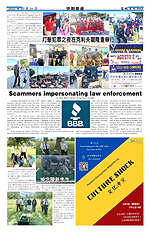|
 |
克利夫兰及周边地区消息
|
| |
Scammers impersonating law enforcement
|
By: Better Business Bureau Serving Greater Cleveland
|
Scammers often pretend to be from an
official agency when they contact victims. The scammers think this
will make you take their claim more seriously. However, there is a
new part to this common scam: some scammers are now able to make
convincing fake badges and other official documents.
The scam starts when you receive a call, text, email, or other form
of communication claiming to be from a law enforcement or government
agency. Scammers will pretend to be anyone, from the Internal
Revenue Service (IRS) to U.S. Immigration and Customs Enforcement
(ICE).
In the message, the scammer will tell you there is a problem that
you need to resolve immediately, usually by sending them a fee.
Scammers will threaten fines, arrest, or other punishments in an
attempt to scare you into doing what they want. In the new addition
to the scam, if you are unsure, the scammers will offer to text or
email doctored credentials to you to confirm their identity. The
badge is either stolen or has been edited to include a different
name.
BBB Serving Greater Cleveland offers the tips below to help you
avoid this scam:
Don’t give in to pressure. Even if the threats scare you, do not
act immediately. Hang up or ignore the message. If you think there
is a possibility you have been contacted by a real law enforcement
agent, call the agency directly using a non-emergency number.
Never send money to strangers. Scammers will probably ask you to
wire funds or buy prepaid gift cards to pay the required “fines.”
Scammers prefer to receive money this way because it is hard to
trace. Plus, you won’t be able to get your money back.
Guard your personal information. Don’t share information like your
address, social security number, or bank account information without
first making sure you are speaking to a legitimate official – even
if they already have some of your information.
Don’t answer messages from strangers. Don’t click on links or
attachments in messages from strangers. They are probably part of a
phishing scam. Block unsolicited calls and text messages
immediately.
Questions Reach out to your BBB at 216.241.7678 or email mybbb@cleveland.bbb.org.
For more news and tips visit BBB.org. |
| |
| |
|

|
| |
| |
| |
| |
| |
| |
| |
| |
| |
| |
| |
| |
| |
| |
| |
| |
| |
| |
| |
| |
| |
| |
| |
| |
| |
| |
| |
| |
| |
| |
| |
| |
| |
| |
| |
| |
| |
| |
| |
| |
| |
| |
| |
|